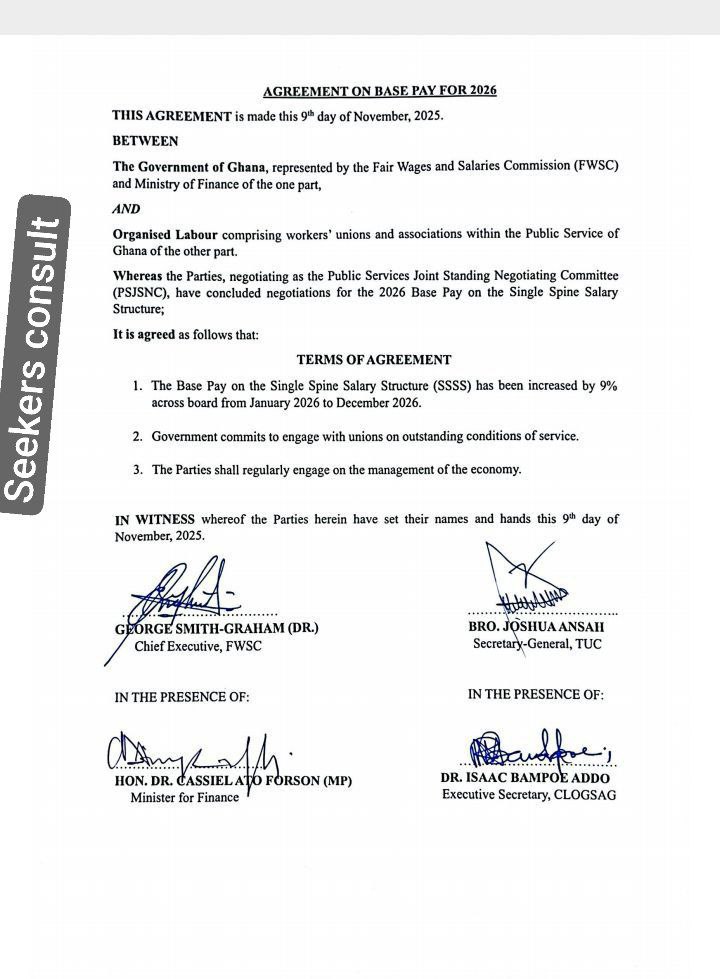
UPDATE FROM THE BEGINING
2026 National Daily Minimum Wage (NDMW) in Ghana: Official Update from the National Tripartite Committee (NTC)
Posted by Seekers Consult 247 – Your Trusted Partner in Career Guidance and Salary Insights November 9, 2025
Dear readers,
At Seekers Consult 247, we’re committed to keeping you informed on the latest developments in Ghana’s labor market, especially those that directly impact your earnings and career planning. Today, we’re breaking down the freshly released official communique from the National Tripartite Committee (NTC) on the 2026 National Daily Minimum Wage (NDMW). This agreement, finalized after rigorous negotiations involving government, employers, and organized labor, marks a balanced step forward amid ongoing economic pressures like inflation, cost-of-living hikes, and business sustainability.
If you’re an entry-level professional, small business owner, or HR manager, this update is crucial for budgeting, compliance, and future salary negotiations. Let’s dive into the key details, implications, and what it means for you.
Follow us on WhatsApp for more updates: CLICK HERE
Seekers Consult
Contact Us for Your Study Abroad Journey
We search for schools and check available scholarships for you
Contact: 0550414552 / 0362297079
Loan for government workers
Transcript Application
English Proficiency
Recommendation letter
Project work/thesis for undergraduate, master’s, and PhD students.
Apply for Affidavit, Gazette instantly
Passport and Visa Applications
All other Internet Services
Background on the Negotiations
In line with Section 113(1)(a) of the Labour Act, 2003 (Act 651), the NTC convened on Sunday, November 9, 2025, in Accra to determine the 2026 NDMW. The committee—chaired by representatives from the Ministry of Labour, Jobs and Employment; Ministry of Finance; Ghana Employers’ Association (GEA); and Trades Union Congress (TUC)—factored in:
- The current economic environment (e.g., inflation trends and currency stability).
- Rising cost of living for workers.
- Sustainability of businesses to prevent job losses.
- The goal of promoting higher employment levels.
This tripartite approach ensures the wage reflects input from all stakeholders, fostering fairness and buy-in.
Key Highlights of the 2026 NDMW Agreement
The communique outlines a modest yet meaningful adjustment to support workers without overburdening employers. Here’s the breakdown:
| Aspect | Details |
|---|---|
| Wage Increase | 9% over the 2025 NDMW (GH₵19.97), resulting in a new daily rate of GH₵21.77. (Monthly equivalent: Approximately GH₵943, based on 26 working days—up from GH₵518 in 2025.) |
| Effective Date | January 1, 2026. All adjustments must be implemented by this date. |
| Compliance Requirements | Establishments, institutions, or organizations paying below GH₵21.77/day must adjust wages immediately. Non-compliance will lead to sanctions under the Labour Act. |
| Tax Exemption Recommendation | The NTC recommends full tax exemption on the 2026 NDMW to provide net relief for low-wage earners. (This is advisory; final approval rests with the Ministry of Finance.) |
| Broader Context | Builds on the 2025’s 10% hike (from GH₵18.15 to GH₵19.97). No direct linkage to the Single Spine Salary Structure (SSSS) base pay, which was separately increased by 10% for 2025. |
Source: Official NTC Communique, signed by Hon. Dr. Abdul-Rashid Pelpuo (Minister for Labour, Jobs and Employment), Hon. Dr. Cassiel Ato Forson (Minister for Finance), Nana Dr. Emmanuel Adu-Sarkodee (GEA President), and Mr. Joshua Ansah (TUC Secretary General).
What This Means for Workers, Employers, and the Economy
- For Workers: This 9% bump translates to an extra ~GH₵425 annually for full-time minimum-wage earners (pre-tax). It’s a welcome buffer against inflation, but organized labor notes it’s still below the “living wage” threshold. If you’re in the informal sector (e.g., market traders or gig workers), advocate for alignment to avoid exploitation. Pro tip: Use this as leverage in your 2026 performance reviews—pair it with skill-building for better raises.
- For Employers: The modest increase prioritizes business viability, reducing layoff risks. SMEs should budget now: Factor in payroll software updates and training for compliance. The GEA emphasizes that tax exemptions could ease the load—lobby your MP if needed!
- Economic Impact: By balancing wage growth with job preservation, the NTC aims to boost consumer spending without spiking unemployment (currently ~13% per recent stats). However, with cedi volatility, watch for mid-year reviews if inflation exceeds projections.
Looking Ahead: 2026 Salary Negotiation Strategies
As we wrap up 2025, this NDMW sets the floor for broader salary talks. At Seekers Consult 247, we’ve helped hundreds navigate these waters—here’s how to position yourself:
- Benchmark Your Role: Use tools like our Salary Calculator (link in bio) to compare your pay against industry averages. Aim 20-30% above minimum for mid-level roles.
- Prepare Data: Highlight your contributions (e.g., “Increased team output by 15%”) and tie them to company goals. Reference the NDMW as your baseline.
- Timing is Key: Start discussions in Q4 2025—before budgets lock in. If unionized, align with TUC guidance.
- Hybrid Options: Negotiate beyond cash—remote work, health benefits, or training stipends can sweeten deals.
Stay proactive: Ghana’s labor market is evolving, and informed negotiators win big.
The 2026 NDMW communique is a testament to collaborative governance, but true progress lies in enforcement and equitable growth. If this sparks questions for your career or business, drop a comment below or DM us at Seekers Consult 247. We’re here to consult, connect, and empower—because your worth isn’t just a wage; it’s your future.
What are your thoughts on this 9% hike? Share in the comments!
Stay seeking, stay thriving. – The Seekers Consult 247 Team
🛑 BREAKING UPDATE: 2026 Base Pay Negotiations Stalled November 7, 2025 | 6:15 PM
🚨 NO PROGRESS TODAY – The Government team has returned without a new mandate, leaving the 2026 Base Pay Negotiations at a complete standstill.
🔴 CURRENT OFFERS ON THE TABLE
| Party | Position |
|---|---|
| Government | 8% increase |
| Organized Labour | Insisting on 12% |
⏰ MEETING TIMELINE – NOV 7
- 10:00 AM: First session begins
- Afternoon: Second session held
- 5:45 PM: Adjourned inconclusively
Follow us on WhatsApp for more updates: CLICK HERE
Seekers Consult
Contact Us for Your Study Abroad Journey
We search for schools and check available scholarships for you
Contact: 0550414552 / 0362297079
Loan for government workers
Transcript Application
English Proficiency
Recommendation letter
Project work/thesis for undergraduate, master’s, and PhD students.
Apply for Affidavit, Gazette instantly
Passport and Visa Applications
All other Internet Services
🔜 NEXT STEPS
✅ Government has appealed for emergency talks over the weekend ✅ Possible reconvening on Sunday ⚠️ Further updates to follow as situation evolves
Stay tuned. More updates as they break. #BasePay2026 #GhanaLabour #SalaryNegotiations
Aggrieved labour unions in Ghana, particularly a coalition of nine education and public university staff groups, have announced plans for a nationwide demonstration on November 13, 2025, in protest against what they call a lack of transparency and selective engagement by the government and Organised Labour leadership during the 2026 base pay negotiations. This stems from ongoing disputes over salary increases on the Single Spine Salary Structure (SSSS), where unions have criticized the leadership for weak bargaining and insufficient consultation.
Key Background on the Negotiations
- Proposals and Offers: Organised Labour initially proposed a 20% base pay increase for 2026, which was reduced to 15% during talks, and later reportedly dropped further amid negotiations. The government countered with offers starting at 2.5% and rising to 5-6%, which unions have rejected as “insulting” and inadequate given rising costs of living, high utility tariffs, and taxes. A more recent update shows unions pushing for 27% while the government offered 20%, but talks ended without agreement and are expected to continue.
- Union Demands: Disappointed groups argue that negotiations should start at no less than 50% to address economic hardships and eroded real incomes. They point to the earlier acceptance of a 10% increase for 2025, followed by a 21% utility tariff hike, as evidence of poor representation.
- Criticisms of Leadership and Process: Unions accuse Organised Labour of collusion with the government, lack of broad consultations (e.g., no meetings with various unions before proposals), and undermining workers’ interests. Transparency issues include barring media from post-negotiation briefings, which deviates from past practices and raises accountability concerns. Some have noted selective involvement, with certain union leaders called while others are excluded.
Statements from Isaac Donkoh
Isaac Donkoh, the immediate past national chairman of the Senior Staff Association-Universities of Ghana (SSA-UoG), has been vocal on this. In a radio interview on Rainbow Radio’s Nyankonton Mu Nsem, he expressed disappointment in the “meagre” proposals, stating they do not reflect workers’ suffering or the SSSS impacts. He was also a signatory to a November 3, 2025, statement condemning the process. Regarding your mention of his comments on a monitored broadcast (possibly GHOne’s #Newsroom with Nadima Umar), it aligns with reports of unions highlighting informal or hidden communications—such as shifting from formal letters to text messages by the Fair Wages and Salaries Commission (FWSC)—as part of the transparency complaints, though specific details on this shift weren’t detailed in available sources.
If you’re updating a previous publication on this topic, I can help refine a draft or pull more specifics—let me know what angle you’re focusing on or if you have the old piece to reference.
Update: Latest Developments in Ghana’s 2026 Base Pay Negotiations (November 7, 2025)
As of November 7, 2025, negotiations for the 2026 base pay for public sector workers in Ghana remain tense, with recent updates revealing incremental shifts in offers but persistent dissatisfaction among labour unions. Building on the joint press statement from November 3, 2025, a new update issued on November 6, 2025, escalates concerns over the process, highlighting issues with invitation methods, potential selectivity in union involvement, and the inadequacy of the government’s latest proposal.
Follow us on WhatsApp for more updates: CLICK HERE
Seekers Consult
Contact Us for Your Study Abroad Journey
We search for schools and check available scholarships for you
Contact: 0550414552 / 0362297079

Loan for government workers
Transcript Application
English Proficiency
Recommendation letter
Project work/thesis for undergraduate, master’s, and PhD students.
Apply for Affidavit, Gazette instantly
Passport and Visa Applications
All other Internet Services
Government’s Offer
Following the initial proposal of 2.5% (later adjusted to 5% in early talks), the government has now tabled a 6% increase in base pay during a meeting on November 5, 2025. This adjustment comes amid ongoing discussions, but unions argue it still falls far short of addressing the economic realities faced by workers, including rising costs of living, high utility tariffs (up 21% post-2025 agreement), excessive taxes, and inflation-eroded incomes. The Fair Wages and Salaries Commission (FWSC) has been leading the government’s side, but their approach to convening meetings has drawn sharp criticism.
Labour Unions’ Reaction
Labour unions continue to express profound disappointment, building on the November 3 statement that criticized Organised Labour’s initial 20% demand (quickly reduced to 15%) as insufficient and lacking consultation. The latest press release from November 6, 2025, condemns the FWSC’s use of phone calls and text messages for inviting unions to negotiations, deeming it “highly unprofessional and unacceptable.” Unions suspect this method allows the FWSC to selectively reach out to “only selected unions,” potentially excluding those less likely to compromise and undermining the inclusivity of the process.
The statement rejects the 6% government offer as “woefully inadequate,” emphasizing that it fails to alleviate the economic hardships endured by Ghanaian workers amid soaring living costs. It calls on the FWSC and Organised Labour leadership to act in good faith, ensure full transparency (including allowing media access to briefings), and involve all unions in the negotiations. Unions warn that continued disregard for fairness and inclusivity will leave them no choice but to mobilize workers nationwide for lawful industrial actions and public demonstrations to demand justice.
This follows earlier demands from groups like the Teachers and Educational Workers’ Union (TEWU) in October for a 50% hike, reflecting widespread frustration among public sector employees, particularly those on the Single Spine Salary Structure (SSSS). The unions assure workers that they are closely monitoring developments and reaffirm their commitment to pushing for a realistic offer that truly compensates for economic pressures.
Joint Statement Signatories (From November 3 Release)
While the November 6 update does not include visible signatories in the provided document, it appears to align with the coalition from the earlier November 3 statement. For reference, here are the key endorsers from that release, representing various university staff associations and labour groups:
| Name | Role/Title | Contact |
|---|---|---|
| Stephen Desu | Innovative Teachers, Founder | 0591427807 |
| Isaac Donkoh | Immediate Past National Chairman (SSA-UoG) | 0245204311 |
| Haruna Rafik | Chairman, SSA-UoG, UG-Korle-bu Branch | 0244948949 |
| Daniel Kweku Obo Manuel | Chairman, SSA-UoG, UniMAC Branch | 0242508957 |
| Philip Kweku Odei | Vice Chairman, SSA-UoG, UG-Legon Branch | 0244207676 |
| Benjamin Nkrumah | Chairman, TEWU of TUC, UG-Branch | 0244027473 |
| Gilbert Ayitey | Chairman, TUAAG, ATU-Branch | 0244850611 |
| Sulemana Abdul-Rahman | National Chairman (TEWU-GH) | 0244147482 |
| Samuel Amuzu Mestill | General Secretary, Public Universities Junior Staff Association (PUJUSA) | 0243601103 |
Negotiations are still underway, with no final agreement announced. The potential for strikes or demonstrations looms if demands for higher increases and better process transparency aren’t met. Stay tuned for further developments, as this could significantly impact public sector salaries starting in 2026.
Update on Ghana’s 2026 Public Sector Base Pay Negotiations (October 31, 2025)
As of today, October 31, 2025, the Fair Wages and Salaries Commission (FWSC) convened a meeting with organised labour and government representatives to kick off discussions on the 2026 base pay for public sector workers under the Single Spine Salary Structure. The session, held at the Ghana Employers Association Conference Room starting at 10:00 a.m., aimed to address demands for a more substantial increase beyond the 10% adjustment implemented for 2025.
However, reports indicate the talks ended without resolution, with parties remaining divided on key proposals. According to available updates, the negotiations have been adjourned to allow for further consultations.
Unofficial Communications and Speculations from Social Media
Amid the lack of detailed official statements, informal discussions and leaks circulating on social media and labour forums suggest the following positions during today’s meeting:
- Labour Unions: Proposed a 27% increase.
- Government: Countered with a 14% offer.
Consequence: The meeting reportedly ended inconclusively due to these gaps.
Next Meeting: Speculations point to a follow-up on November 4, 2025
Stay tuned as we gather more information from correspondents inside and monitor official channels for verified developments.
The 2025 daily minimum wage remains at GHS 19.97, with no changes announced from this session. If you have tips or updates, drop them in the comments!
INVITATION TO MEETING ON BASE PAY NEGOTIATION OCTOBER 2025
INVITATION TO MEETING – BASE PAY NEGOTIATIONS
The Fair Wages and Salaries Commission (FWSC) respectfully invites one (1) representative each from the Organized Labour (as per the attached distribution list) to participate in a meeting on the 2026 Base Pay Negotiations.
The purpose of the meeting is to commence engagements towards the determination of the National Base Pay for the 2026 financial year in accordance with the mandate of the Commission and in line with the Government’s broader public sector pay policy.
The details of the meeting are as follows:
Date: Friday 31* October, 2025 Time: 10:00 a.m. Venue: Ghana Employers Association (Conference Room) Agenda: 2026 Base Pay Negotiations
Your participation in this meeting is highly anticipated as it forms part of the structured consultative process to ensure equity, fairness and sustainability in the public sector regime. The Commission encourages punctual attendance to facilitate a smooth and productive session.
Follow us on WhatsApp for more updates: CLICK HERE
Seekers Consult
Contact Us for Your Study Abroad Journey
We search for schools and check available scholarships for you
Contact: 0550414552 / 0362297079

Loan for government workers
Transcript Application
English Proficiency
Recommendation letter
Project work/thesis for undergraduate, master’s, and PhD students.
Apply for Affidavit, Gazette instantly
Passport and Visa Applications
All other Internet Services
Understanding the 11.5% Speculation in Ghana’s 2026 Base Pay Negotiations
Based on the invitation letter from the Fair Wages and Salaries Commission (FWSC) dated October 29, 2025, for the meeting on October 31, 2025, this is the formal start of discussions for the 2026 national base pay under the Single Spine Salary Structure (SSSS). No specific percentage increase has been announced or agreed upon yet—the purpose is to “commence engagements” toward determining the base pay for the 2026 financial year, aligning with government policy on equity and sustainability. This early timing allows input before the national budget, but it has sparked online and media speculation about potential increases, especially given economic factors like inflation.
Why the Mention of 11.5%? (And Why It Might Be “Earlier” News)
Averaged past increases: Historical public sector salary adjustments in Ghana include 11% in 2018 and 12.5% in 2017 under previous administrations. The average of these (11.75%) is close to 11.5%, which might explain the confusion.
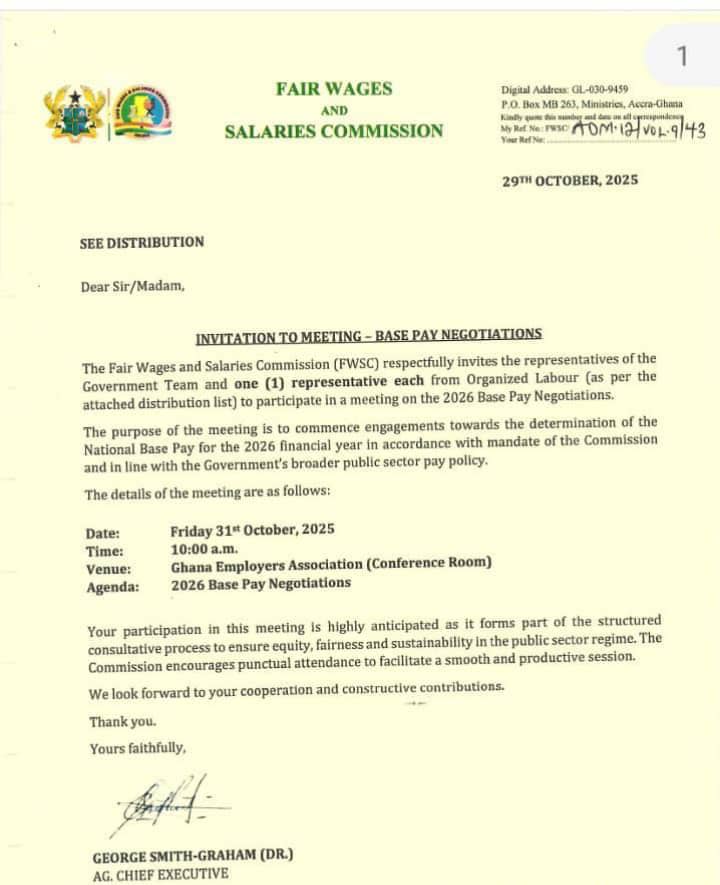
The invitation itself doesn’t mention any percentage; it’s about kicking off talks. Speculations often arise because unions like the Trades Union Congress (TUC) and Ghana Registered Nurses and Midwives Association (GRNMA) have pushed for timely negotiations to avoid delays that “deny workers fair salary adjustments.”
What People Are Saying: Speculations and Concerns
Public discourse on social media and news outlets shows a range of expectations for the 2026 increase, driven by dissatisfaction with the 2025’s 10% (seen as insufficient amid rising costs) and calls for more substantial hikes. Here’s a breakdown based on recent sentiments (from October 2025 onward):
- Range of Speculated Increases:
- Minimum 10% to maximum 18%: Organised Labour has indicated this as a potential outcome, with some reports suggesting workers anticipate at least 10% but push for up to 18% to counter economic pressures.
- 20% or more: Some users on X express hope for “not less than 20%,” criticizing lower figures as inadequate. One post noted: “I expect not less than 20% salary increment in 2026.”
- Inflation and Real-Wage Concerns:
- Many highlight projected 2026 inflation at 15%, arguing that a 10% increase would leave workers “5% worse off.” A user stated: “I don’t understand labour oh. Projected average expected inflation for 2026 is 15%. Workers would be 5% worse off!”
- This ties into broader frustration: Unions are ramping up pressure for a deal before the end-October budget deadline, warning that delays erode purchasing power.
- Criticism of Government and Past Deals:
- Some compare to historical highs like 23% in 2024 or 30% in 2023, calling 10% “unacceptable” and urging better offers.
- On X, there’s skepticism about announcements: One post quipped, “They’ll announce 104k, but watch half the workers get 65k and ‘arrears pending approval’ “—referring to potential minimum wage or salary figures, not percentages, but highlighting distrust in delivery.
Background on the FWSC and Base Pay Negotiations
The Fair Wages and Salaries Commission, established under Act 737 of 2007, is tasked with implementing and monitoring public sector pay policies to eliminate disparities and promote fairness. Base pay negotiations typically occur annually and involve tripartite discussions with the government, organized labor (such as the Trades Union Congress), and employers. These talks determine the minimum salary level on the SSSS, influencing overall wage adjustments.
In recent years, these negotiations have been pivotal amid economic challenges. For 2025, the government approved a 10% increase in base pay effective from January, following agreements by the National Tripartite Committee. This came after labor unions pushed for higher increments to counter inflation and rising living costs. Now, with 2026 negotiations commencing, unions like the Ghana Registered Nurses and Midwives Association (GRNMA) have warned against delays, arguing that procrastination denies workers timely adjustments. Organized labor formally started talks with the government on October 13, 2025, aiming for finalization by the end of October to align with the 2026 budget.
The Ghana Federation of Labour (GFL) has even called for a entirely new fair wage structure for 2026, citing persistent concerns over wage inequities. Past negotiations, such as those in 2016, resulted in a 10% increase, showing a pattern of modest adjustments amid fiscal constraints.
Ghana’s Economic Context in October 2025
These negotiations don’t happen in a vacuum—they’re deeply tied to Ghana’s current economic trajectory. As of October 2025, the economy is showing signs of recovery. GDP growth accelerated to 6.3% in Q2 2025, driven by the services sector, up from 5.7% the previous year. The World Bank has upgraded its 2025 growth forecast to 4.3%, with a projected primary surplus of 1.5% of GDP through spending restraint. Inflation has dipped into single digits for the first time since 2021, standing at around 9.4% in September, though the World Bank projects it to end the year at 15.4%.
Ghana is under an IMF Extended Credit Facility program, set to end in 2026, which emphasizes fiscal discipline and debt sustainability. Robust exports and remittances have bolstered momentum, but challenges like high pension disparities (some retirees earning GH₵140,000 monthly while others struggle) and calls to extend the retirement age to 65 highlight ongoing inequities. The cedi’s stability at around 60 to the USD reflects a “economic reset” defying skepticism, but workers argue that wage growth must keep pace with these improvements.
What to Expect from the 2026 Negotiations
Based on the invitation, this meeting at the Ghana Employers Association on October 31, 2025, marks the formal kickoff for determining the 2026 national base pay. Labor unions are ramping up pressure for a deal before the November 2025 budget presentation, with some starting positions as high as 50% increases—though compromises often land in the 5-15% range. Key issues likely include inflation adjustments, relativity across sectors, and allowances under the SSSS.
For public sector workers, a favorable outcome could mean better financial security, especially as the minimum daily wage rose to GHS 19.97 in 2025. However, fiscal hawks in government may push for restrained increases to maintain the IMF-backed surplus.
Implications for Workers and the Economy
This process is about more than numbers—it’s about equity and sustainability, as the FWSC emphasizes. Delays, as noted by unions, could exacerbate worker dissatisfaction and lead to strikes, disrupting services. On the flip side, a balanced agreement could boost consumer spending and support growth projections of 4.3% in 2025.
As Ghana eyes long-term stability post-IMF, these negotiations will test the tripartite framework’s effectiveness. Workers deserve fair compensation, but it must align with broader economic goals.
All in one Content for Salary Negotiations Update So, far;
2026 Salary Negotiations Update
Overview
Negotiations for Ghana’s 2026 national daily minimum wage are nearing completion, with the National Tripartite Committee expected to finalize discussions next week. These talks are pivotal in shaping the base pay for public sector workers in 2026, balancing workers’ demands with Ghana’s economic constraints, including its ongoing International Monetary Fund (IMF) programme.
Key Developments
-
Labour’s Position: Labour representatives, including those from the Ghana National Association of Teachers (GNAT) and the National Association of Graduate Teachers (NAGRAT), are advocating for a minimum wage increase exceeding 10%.
-
Government and Employers’ Stance: Citing economic limitations tied to the IMF programme, government and employer representatives are adopting a cautious approach, aiming to moderate the proposed increase.
-
Progress and Timeline: Thomas Tanko Musah, General Secretary of GNAT, emphasized that negotiations are progressing steadily. He noted, “The rule of the game is that you communicate outcomes. Everything on the table is a proposal and subject to change, so let us all hold our figures.” A final decision is expected soon.
-
Next Steps: Angel Carbonu, President of NAGRAT, confirmed that the announcement of the new minimum wage will trigger the next phase of negotiations. He stated, “The minimum wage will be announced soon, and from there we have set the date for discussions on the base pay.”
Implications
The outcome of these negotiations will set the foundation for the 2026 base pay for public sector workers. The committee faces the challenge of addressing workers’ demands for fair compensation while navigating Ghana’s fiscal realities. The final wage announcement will be a critical step in ensuring economic stability and worker satisfaction.
Sources
-
Statements from Thomas Tanko Musah, General Secretary of GNAT, to journalists in Accra.
-
Statements from Angel Carbonu, President of NAGRAT.
Last updated: October 24, 2025
Update: Tripartite Negotiations Kick Off for 2026 Public Sector Base Pay
In a significant development for Ghana’s public sector workforce, Organised Labour has officially launched negotiations with the government to establish the base pay for 2026. This comes hot on the heels of a 10% salary hike approved this year under the Single Spine Salary Structure (SSSS), which has provided some relief amid rising living costs but left many workers calling for more robust adjustments ahead.
With the 2026 national budget slated for presentation to Parliament in November, the timing couldn’t be more critical. The government faces mounting pressure to accelerate the talks, ensuring that any agreed-upon increases are baked into the fiscal blueprint. Union leaders, speaking on behalf of teachers, health workers, and other public servants, have urged a fast-tracked process to avoid another year of uncertainty.
The tripartite committee—comprising representatives from labour unions, the government, and employer bodies—has already convened its initial meetings. However, no concrete figures have been tabled yet. Sources close to the discussions indicate optimism that a proposal on the national daily minimum wage could emerge as early as this week. This minimum wage serves as the foundational benchmark for calculating broader base pay adjustments across the SSSS, making it a pivotal piece of the puzzle.
“Workers can’t afford to wait,” one union spokesperson emphasized, highlighting the erosion of purchasing power due to inflation. “Capturing these gains in the 2026 budget reading is non-negotiable—it’s about securing fair wages that reflect our contributions and the economic realities we face.”
As negotiations progress, stakeholders will be watching closely for signs of compromise. Will the government prioritize fiscal prudence, or will labour’s push for a substantial uplift prevail? Stay tuned for further updates as the committee deliberates and the budget deadline looms. What are your thoughts on the ideal percentage increase for 2026?
7th September 2025.
TUC Urges Calm as Key Minimum Wage Negotiations for 2026 Are Set to Begin
Follow us on WhatsApp for more updates: CLICK HERE
The Trades Union Congress (TUC) has called for patience as Organised Labour prepares to enter crucial negotiations for a new national minimum wage and salary adjustments. The talks, which are set to establish the standard for the coming years, are taking a methodical approach to ensure a fair outcome for employees.
In an exclusive interview with 3news’ Labour Affairs Correspondent as monitored by seekers, TUC Secretary-General Joshua Ansah revealed that a technical committee has already been established to lay the groundwork for these high-stakes discussions.
This committee is tasked with a critical mission: to thoroughly assess key economic indicators, including inflation rates and broader macroeconomic trends. This data-driven approach is intended to provide a solid, factual foundation for the formal negotiations with the government and other social partners.
Mr. Ansah highlighted a fundamental issue with the current system, stating, “In the last negotiations, Organised Labour demanded a new formula for calculating both the minimum wage and the base pay.”
He explained that the existing model is inadequate and negatively impacts workers: “The current formula affects workers negatively because it uses only inflation to determine these figures, which does not fully reflect the true cost of living.”
This signals a strong push from Labour for a more comprehensive calculation method that better captures the real economic pressures faced by everyday Ghanaians.
The Roadmap to a New Wage
The negotiation process will follow a clear structure:
The technical committee completes its assessment.
It then submits its findings and recommendations to the National Tripartite Committee.
The main negotiations between Organised Labour, government, and employers will officially begin.
Addressing concerns about the timeline, the TUC Secretary-General provided an important clarification for all workers: the new wage structure being discussed is slated to take effect in 2026.
“This minimum wage is for 2026 — not for 2025 — so it’s better we take our time and do it right than to rush the process,” Mr. Ansah noted. This assurance aims to manage expectations and underscores the union’s commitment to a thorough and effective negotiation process rather than a hurried one.
Pushing for a Significant Increase
With economic pressures continuing to squeeze household budgets, Organised Labour has pledged to aggressively push for a substantially better salary increment than the 10% adjustment granted this year. The outcome of these technical assessments and the subsequent negotiations will be vital for workers in all sectors seeking relief from the rising cost of living.
Stay tuned to this blog for further updates as this story develops.
As 2026 salary negotiations loom, public sector workers are watching closely. The Fair Wages and Salaries Commission (FWSC) is urging unions to be realistic, while organized labor is pushing for a significant pay raise.
The Current Situation
This year, public sector workers received a 10% salary increase. However, unions quickly expressed dissatisfaction, calling the increment “woefully inadequate.” In response, President John Mahama appealed for patience, but pressure has continued to build for a more substantial adjustment.
Sources within organized labor suggest they will demand a raise of more than 50%, a figure they believe is justified by the current state of the economy.
Follow us on WhatsApp for more updates: CLICK HERE
Seekers Consult
Contact Us for Your Study Abroad Journey
We search for schools and check available scholarships for you
Contact: 0550414552 / 0362297079

Loan for government workers
Transcript Application
English Proficiency
Recommendation letter
Project work/thesis for undergraduate, master’s, and PhD students.
Apply for Affidavit, Gazette instantly
Passport and Visa Applications
All other Internet Services
Calls for Restraint
Dr. Smith Graham, CEO of the FWSC, has appealed to labor unions to be considerate during the upcoming negotiations. While he noted that a 50% proposal hasn’t been officially submitted, he emphasized the importance of reaching a consensus. “We will negotiate and come to a consensus,” Dr. Graham stated. “By the close of the month, we should be able to conclude.”
The Minister of Labour, Jobs and Employment, Dr. Rashid Pelpuo, echoed this sentiment, encouraging unions to consider the broader economic implications. He highlighted factors like the cedi’s value, inflation, and the total cost of living as key considerations that will guide the negotiations.
A Long-Term Solution?
The ongoing conversations have also renewed calls for a long-term solution to Ghana’s wage disputes: the establishment of an Emoluments Commission. According to Dr. Graham, this constitutional body could be the answer to the persistent inequities in the labor sector. He believes the commission would reduce external influences on negotiations and address disparities, particularly those related to Article 71 office holders.
In a related development, a new board for the FWSC has been inaugurated. The board is expected to help streamline engagement between the government and labor, fostering a more transparent and collaborative process.
Do you want to know more about the Single Spine Salary Structure or Article 71 office holders?
Follow us on WhatsApp for more updates: CLICK HERE


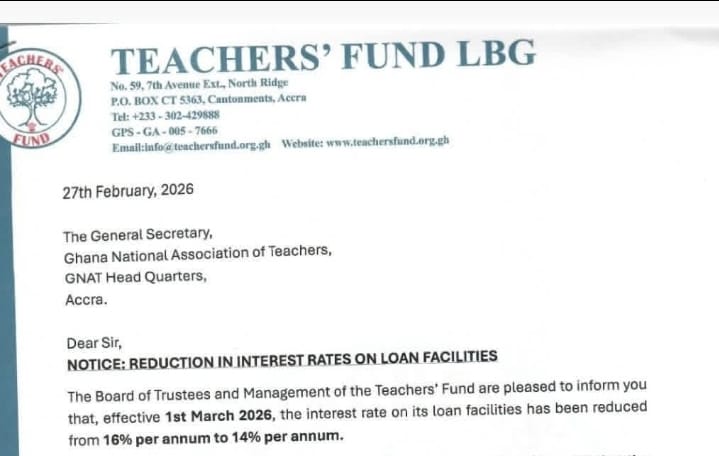
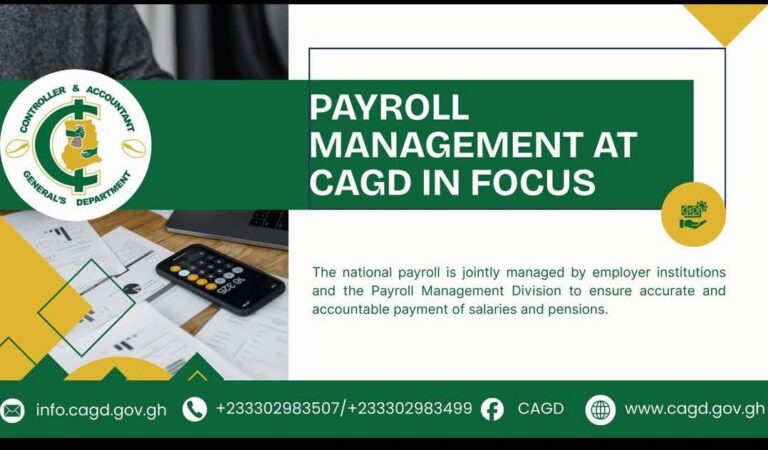
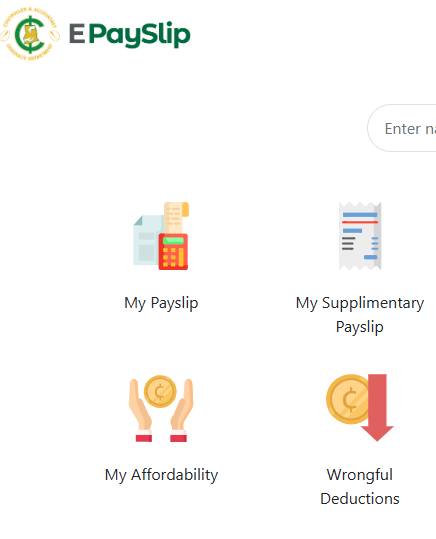
1 thought on “2026 Salary Negotiations to be finalised by end of this Month ; Update so far”